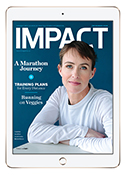Has your running hit a plateau? You were making such great progress, but that was a while ago. The fitness gains just don’t seem to be as noticeable lately, and your personal bests are a thing of the past.
If this sounds like where you are, you need to understand what likely got you there. Training is all based on the principle of supercompensation. When you train hard, you create microscopic damage to your muscles and force the release of hormones that create changes to your aerobic capacity. If given some rest, recovery and proper nutrition, your body comes back stronger and fitter than before. We train to cause this sort of an adaptation.
But sometimes this doesn’t work as hoped. Many runners never push their limits and don’t work hard enough to force their body to adapt. Doing the same distance at the same pace every day might work at first, but then the body gets used to this stress and no longer needs to adapt.
Another common mistake is not giving your body adequate recovery to rest and come back stronger. At first this just leads to a constant state of fatigue and an inability to run the same times or distance you could. Eventually, you get sick or injured.
Lastly, you need proper nutrition so that your muscles can repair and recharge for the next bout of hard work. Some runners just don’t eat enough of the right foods to benefit from their training.
Here’s some tips how you can apply the principle of supercompensation and move your training to the next level.
1. Have Hard and Easy Days
One of the differences between recreational and elite runners is the difference between their hard and easy days. Unlike most recreational runners, elite athletes take their hard days very hard and their easy days quite easy. Plan for a long run and at least one other hard run per week. The other days should be easy recovery running. Easy days mean slowing down much more than you probably are used to. Aim to run a minute slower per kilometre than your marathon pace or a minute and a half slower than your 10 km pace.
2. Train at Your Key Paces
Some paces are more valuable for your improvement than others. Every two weeks, try to do some running at your 5 km and 10 km paces/effort, and at a pace that you could hold for an hour. You will get a different training stress from each of these paces, but they don’t all need to be crammed into one week.
3. Take Recovery Seriously
Make sure you eat well after a hard or long run. Consume 250-400 calories within 20 minutes of finishing, and ensure this contains some carbohydrates and protein. Take some time to roll out your muscles on a foam roller and to do some gentle stretching. Most of all, make sure you run at a slow and comfortable pace on your easy days.
4. Run Long
A weekly long run can give you huge fitness gains. Ideally, your long run is 20-25 per cent of your weekly running volume. If you are training for a marathon or half-marathon, your long runs will need to build up to covering 80 per cent of your racing distance. These should be done at a comfortable pace. To reduce your chances of injury, try to run these on softer surfaces.
5. Run with Others
Training in a group or with a training partner is a great way to get more quality in on your hard days. But it doesn’t come without any risks. Never let your competitive drive take over in training by racing your workouts. Pick training partners that are evenly matched so that you can help each other get in a quality session. There are no prizes for winning workouts.
Moving your training to the next level requires some planning and may include some alterations to your regular routine. While there are some excellent free online programs, none of them beat the value of working with a coach. If you are serious about improving your running, then getting some coaching is a great decision. Look for a coach who has some experience in the sport and who is able to listen to your needs and adjust their approach accordingly.
Read this story in the digital edition of IMPACT Magazine.
IMPACT Magazine’s 2021 Running Issue
Looking for running inspiration? Training for a race? We have first-rate training programs designed by some of the best running coaches for your next 10K, Half-Marathon, Marathon and 70.3 distances, plus an epic Road Running Shoe Review to help you get started on the right foot. Plus – our annual RACE SOURCE GUIDE features hundreds of races that you can participate in from virtual to in-person.

















